I’m a lucky shooter. Thanks to my constant search for knowledge to improve my shooting skills I discovered Paul Hughes on Instagram. His posts spoke to my shooting mind that wanted to improve its own mental game. Paul kindly let me into his course as soon as he launched it and I’ve never looked back.
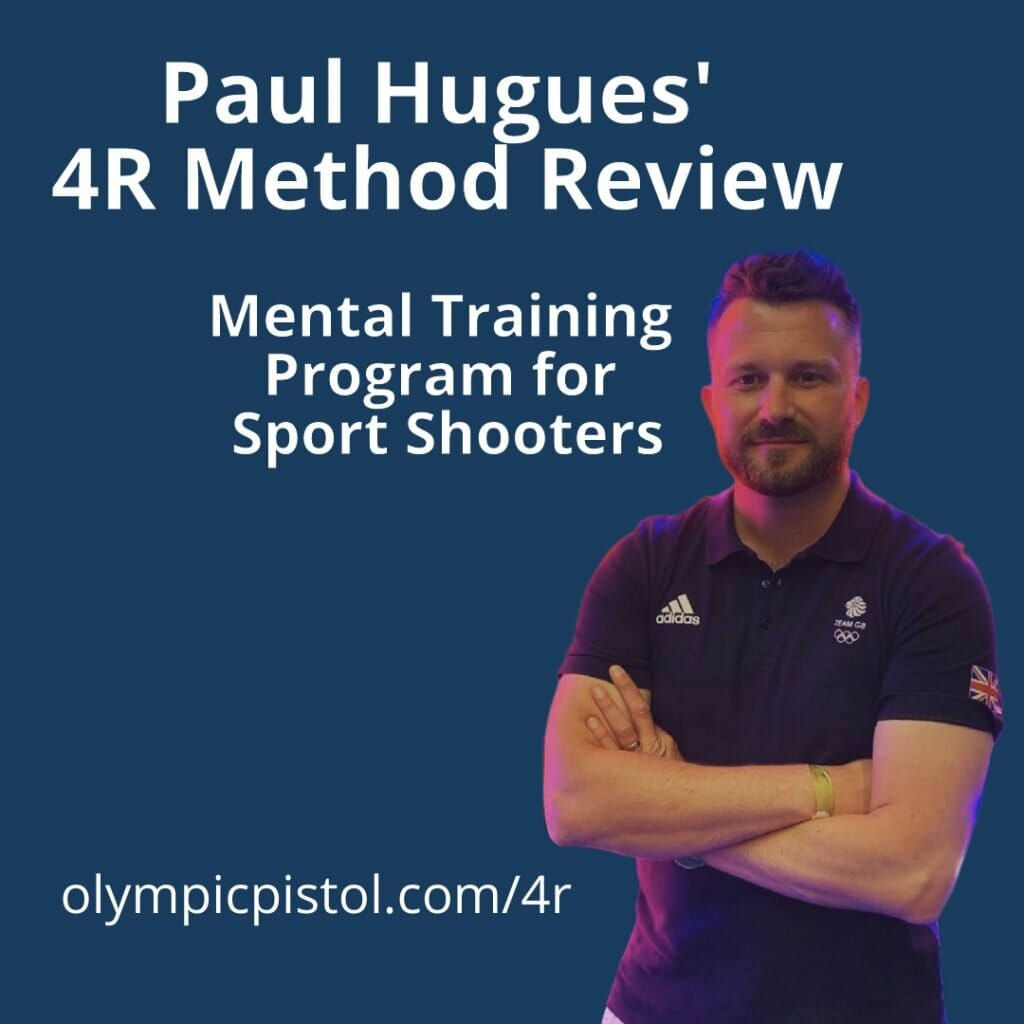
Here’s an example of those early posts he crafted:
Table of Contents
Who’s Paul and why does his advice matter?
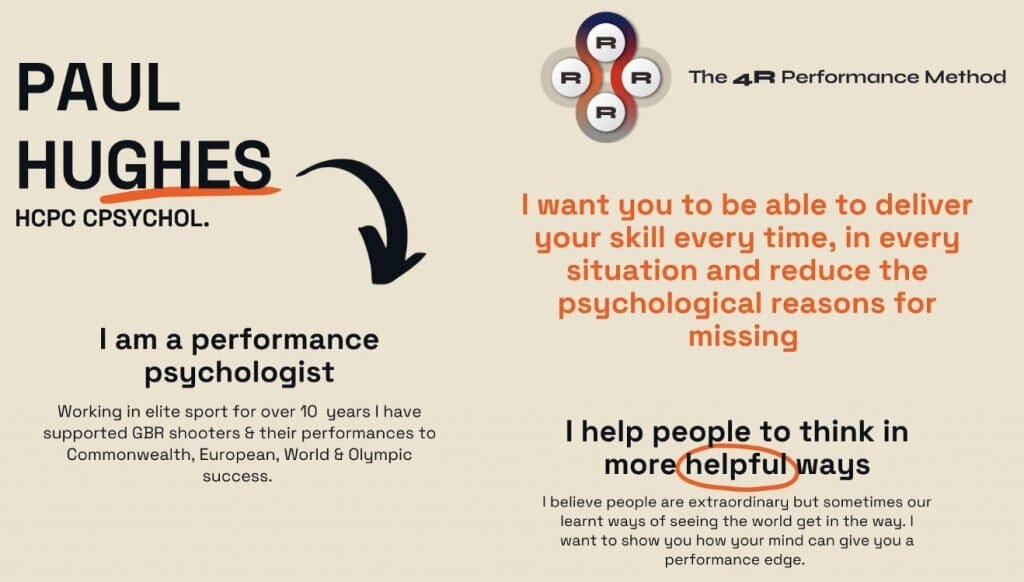
Paul is a sports psychologist with a decade of experience training shooters and coaches of all levels, who has been leading the psychologists team of the Great Britain shooting team. When you read his posts or watch his videos you immediately see that he’s different from the gurus we sometimes find: he’s to the point, cares about shooters, and brings with him tips and tools that we all can implement.
The mind is the most misunderstood performance opportunity.
Paul Hughes
To learn more about him and his way of teaching read this interview and download his free ebook at the bottom of the course page which will already teach you something useful.
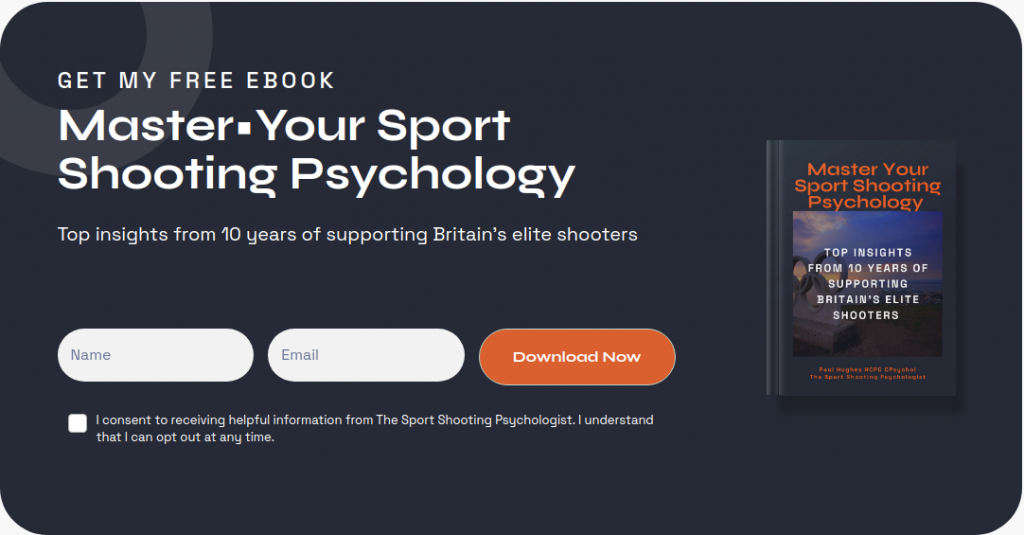
Content of the course
Principles and what to expect
There are three principles that you have to take into consideration for the course:
- You have to do work: reading and listening are not enough. Paul provides worksheets and instructions for the range to put your brain and skills to work.
- There are no tricks, no magic. We are all different and will benefit differently from this course.
- You may experience a dip in performance at the beginning as you start processing your shooting more consciously. Keep going to improve your results with a repeatable routine that builds on your strengths.
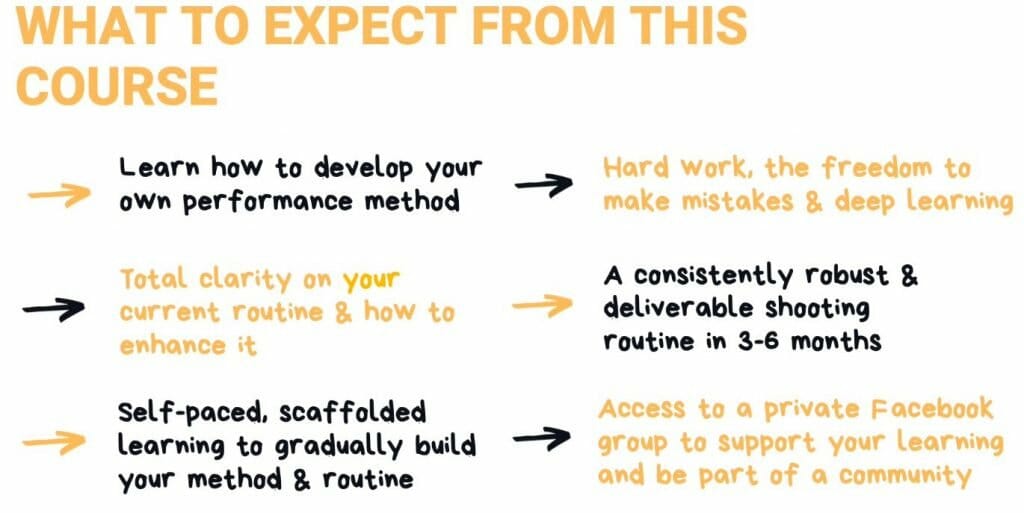
Concept
The core concept of the course is bringing mental consistency into your shooting thanks to your mental routine. This is done on top of your technical and physical work: without them no mental training can improve your performance.
Course structure
This is the current content of the course:
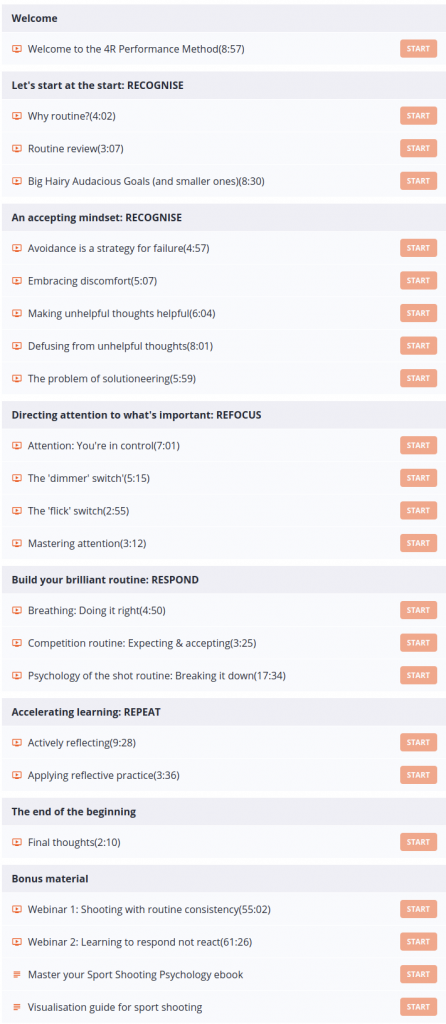
Each lesson is a video of him speaking with great looking slides (you can also learn from him for your next presentation). His accent is easy to understand and he speaks slowly (I watched all his videos at an increased speed). If you ever have a doubt you just have to post a comment in the lesson and he’ll get back to you quickly.
Paul keeps on adding videos as he makes them available to the public or sometimes even before to the community members, so expect this course outline to grow. He’s got a big focus on improving the course and making it even better.
Keys to performance
The keys to performing are the 4R: recognize, refocus, respond, and repeat. For this first you learn to understand yourself and your behaviors, to notice when things are happening. Then you change your focus to what matters to get the desired outcome, you execute your skill, and you keep on doing this throughout your match or training session.
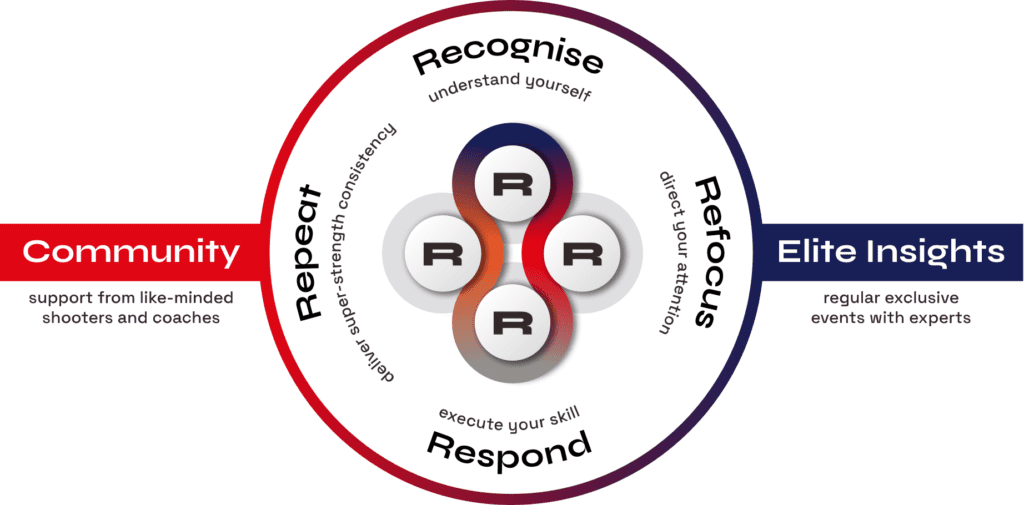
And all this without having to keep a 100% concentration throughout your session thanks to his attention flicker and dimmer switches.
Mental routine
This is all put together in your mental (psychological) routine, which enables you to deliver your technical ability repeatedly, by reinforcing what you need to do and helping you manage your responses to what you are facing. The mental routine complements your physical shooting routine.
The thing about the psychological routine that is more impacting is that most of us do not have one, at least before taking this course. Thankfully you dive right in with the workbooks to document your current situation and build from there to develop your own mental routine adapted to you.
Goals
Paul does a great job about explaining how to develop S.M.A.R.T.E.R. goals, why they matter and the different kinds there are: outcome, process, and performance goals. The why is important here, to help you get to where you want to be.
Acceptance
This is what has helped me the most: acceptance. One of the bases of Paul’s method is ACT (Acceptance and Commitment Therapy). It builds psychological flexibility and helps you see thoughts for what they are: helpful or unhelpful. You are better prepared to react to emotions and disconfort when they show up. They will not longer be a surprise, and your routine and the tools Paul provides will help you deal with these thoughts and emotions, to defuse them and refocus your attention in your process to shoot great shots.

Attention

Contrary to what many believe, you can be in control of your attention and redirect it to help you achieve your desired outcomes. With Paul’s method you learn how to focus your internal and external attention, plus he provides two attention exercises with audio files that you can download and a helpful breathing technique to stop over-working and be relatively calm and composed. The use of mental imagery is detailed as part of Paul’s adaptation of Singer’s five step approach to a shooting routine:
The 5-SA is a learning strategy previously shown to enhance the learning of self-paced motor tasks and consists of five substrategies: (1) readying, (2) imaging, (3) focusing, (4) executing, and (5) evaluating.
Singer’s Five-Step Approach: Does Every Bit Count?
Accelerated learning
Part of your improving your attention is done by reflecting to accelerate your learning. His presentation of the Gibbs reflective cycle is another useful tool that we can incorporate to our shooting:
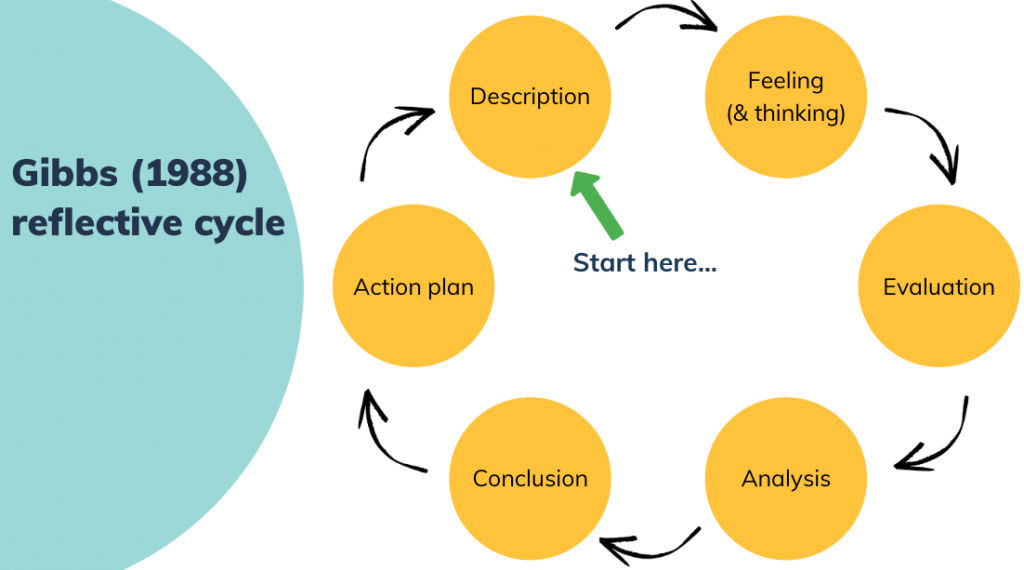
Luckily, Paul includes a lot of helpful questions that you can use as cues for reflection.
Community
The 4R alumni headquarters community is varied and brings value from different shooting sports (pistol, rifle, shotgun…). You find shooters and coaches with different levels (from beginners to Olympians) that actually want to share, learn, and help. We come together through posting on the community and through the bi-weekly community calls with Paul, where we dive into the questions of one of the athletes or coaches and discover new sections as Paul is developing them, so that he can incorporate our feedback (like the module on pressure training).
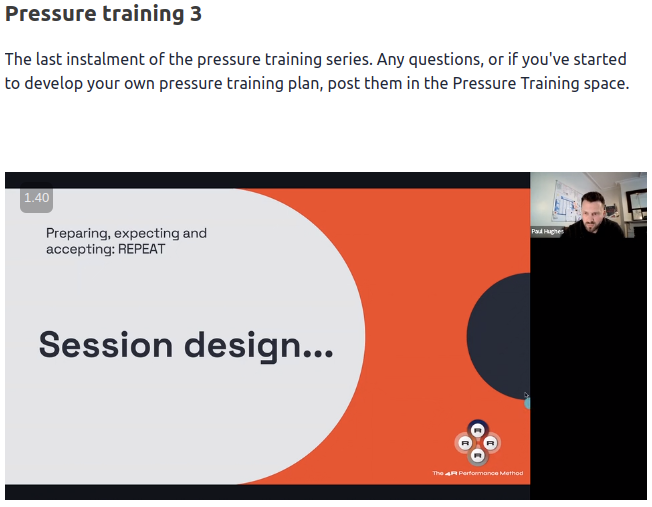
The community is organized via Circle, a platform that you can access online via web or an iOS app (Android app in development).
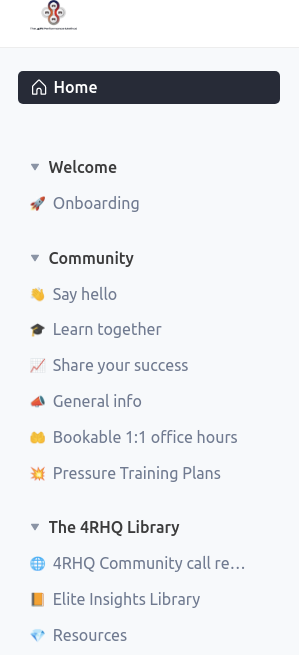
The calls are currently being done via Zoom, although the invitations arrive via Circle in an email that allows to add them easily to your calendar.
One on One calls
On top of the community calls, every member of the community can book a monthly one on one call with Paul Hugues. I’ve done a couple of them and they have helped me.
Impact of the course
Thanks to the framework and tools he shares and the work I’ve done implementing them my mental training and performance have improved. The course has also improved other areas of my life thanks to the same tools and knowledge, which are applicable for business and personal matters.
I regularly go back to my notes and with the help of the calls he organizes for all shooters and trainers that have taken his course I keep on improving and learning.
Since I took the course it has changed names (it used to be called Build your brilliant shooting routine), more content has been added, and a community space has been created for the alumni where calls, videos, questions, and answers are shared.
No magic: a method
Paul says it from the beginning, there’s no magic. My insecurities and issues have not disappeared, but I’m better equipped to deal with them and they show up less often. I’m an improved version of myself and I don’t need magic: I have useful tools and methods that I can use to improve. This is what this course has given me.
My bad performances have not disappeared, but my average is going up and I think I’m handling them better. Best of all, I’ve found a renewed joy in shooting.
Don’t fool yourself though: the struggle does not disappear, but it is more manageable. After all, without the struggle we would not be so hooked our our shooting sport 🙂
Price
The current price of the course is at £497 (discount below), with three payment options (1, 2, or three payments). The price has increased a lot from the first edition of the course and I would not find it strange that it would go up again (it is that good). Don’t get blinded by it though, think:
- How much would you have to pay a coach to go through the same content if I was able to find a mental coach that gave me the same confidence?
- How much is it worth to you to have more confidence and perform consistently better?
Get a 10% discount before it disappears or the price raises with the code RAMON10
And now that I’m done with this review, I’m going back to my notes and the course to update the worksheets and see how to improve with the things that I have forgotten or see and understand differently now.
